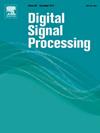Drift suppression method based on signal stability detection and adaptive Kalman filter for NMR sensor
IF 2.9
3区 工程技术
Q2 ENGINEERING, ELECTRICAL & ELECTRONIC
引用次数: 0
Abstract
The small volume, high precision, and low cost of Nuclear Magnetic Resonance (NMR) sensors make them one of the best choices for future miniaturized and chip-scale Inertial Navigation System (INS). Due to technical and process limitations, NMR sensors inevitably exhibit random drift. To suppress these errors, a drift suppression method based on Signal Stability Detection and Adaptive Kalman Filter (SSD-AKF) for NMR sensors is proposed. Firstly, a state space model for the Kalman filter is established based on an Auto Regressive Moving Average (ARMA) sequence model. Secondly, to address the issue of reduced filtering accuracy caused by unstable signal noise in innovation-based AKF, an adaptive filtering method aided by a signal stability detection is proposed. The proposed method utilizes the standard deviation of prior information to assess the stability of the signal. Based on this assessment, the adaptive filter adjusts the gain matrix, ultimately enhancing the stability of the filter. The dynamic experimental results show that the proposed method can effectively improve filter performance and reduce sensor drift.
基于信号稳定性检测和自适应卡尔曼滤波器的核磁共振传感器漂移抑制方法
核磁共振(NMR)传感器体积小、精度高、成本低,是未来微型化和芯片级惯性导航系统(INS)的最佳选择之一。由于技术和工艺的限制,核磁共振传感器不可避免地会出现随机漂移。为了抑制这些误差,本文提出了一种基于信号稳定性检测和自适应卡尔曼滤波器(SSD-AKF)的核磁共振传感器漂移抑制方法。首先,基于自回归移动平均(ARMA)序列模型建立了卡尔曼滤波器的状态空间模型。其次,针对基于创新的 AKF 中不稳定信号噪声导致滤波精度降低的问题,提出了一种以信号稳定性检测为辅助的自适应滤波方法。该方法利用先验信息的标准偏差来评估信号的稳定性。在此基础上,自适应滤波器调整增益矩阵,最终增强滤波器的稳定性。动态实验结果表明,所提出的方法能有效提高滤波器性能,减少传感器漂移。
本文章由计算机程序翻译,如有差异,请以英文原文为准。
求助全文
约1分钟内获得全文
求助全文
来源期刊

Digital Signal Processing
工程技术-工程:电子与电气
CiteScore
5.30
自引率
17.20%
发文量
435
审稿时长
66 days
期刊介绍:
Digital Signal Processing: A Review Journal is one of the oldest and most established journals in the field of signal processing yet it aims to be the most innovative. The Journal invites top quality research articles at the frontiers of research in all aspects of signal processing. Our objective is to provide a platform for the publication of ground-breaking research in signal processing with both academic and industrial appeal.
The journal has a special emphasis on statistical signal processing methodology such as Bayesian signal processing, and encourages articles on emerging applications of signal processing such as:
• big data• machine learning• internet of things• information security• systems biology and computational biology,• financial time series analysis,• autonomous vehicles,• quantum computing,• neuromorphic engineering,• human-computer interaction and intelligent user interfaces,• environmental signal processing,• geophysical signal processing including seismic signal processing,• chemioinformatics and bioinformatics,• audio, visual and performance arts,• disaster management and prevention,• renewable energy,
 求助内容:
求助内容: 应助结果提醒方式:
应助结果提醒方式:


